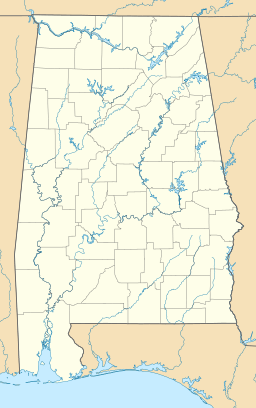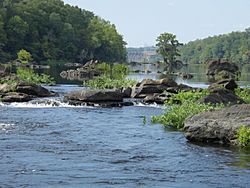Jordan Lake (Alabama) facts for kids
Quick facts for kids Lake Jordan |
|
|---|---|
 |
|
| Location | Elmore County, Alabama, United States |
| Coordinates | 32°37′08″N 86°15′27″W / 32.61900°N 86.25743°W |
| River sources | Coosa River |
| Max. length | 18 mi (29 km) |
| Surface area | 6,800 acres (28 km2) |
| Water volume | 236,200 acre⋅ft (291,300,000 m3) |
| Shore length1 | 188 mi (303 km) |
| 1 Shore length is not a well-defined measure. | |
Jordan Lake is a beautiful lake located in Elmore County, Alabama. The closest big town to the lake is Wetumpka. It's a popular spot for outdoor fun and adventure.
About Jordan Lake
Jordan Lake is a special type of lake called a reservoir. This means it's a large, artificial lake created to store water. It covers a huge area of about 6,800 acres (28 km2). That's like more than 5,000 football fields!
The shoreline of Jordan Lake stretches for about 188 miles (303 km). Imagine walking all that way! The lake itself is about 18 miles (29 km) long. It holds a very large amount of water.
Fun Activities at Jordan Lake
Jordan Lake is a great place for many outdoor activities. It's especially famous for fishing. Many different kinds of fish live here.
- You can catch largemouth bass and spotted bass.
- There are also bluegill and other types of sunfish.
- Anglers can find crappie and catfish.
- If you like bigger fish, look for striped bass and hybrid white bass.
The lake has two places where the public can easily get into the water. This makes it simple for everyone to enjoy fishing or boating.
Building Jordan Dam
Jordan Lake was created because of a special dam called Jordan Dam. The dam was finished on December 31, 1928. It was built by a company called Alabama Power.
The lake and dam were named after the mother of Reuben and Sidney Mitchell. These two men were very important in building another dam nearby, called Mitchell Dam. Both dams are on the Coosa River and help make electricity.
Jordan Dam is made of concrete and stands 125 feet high. Its main job is to create hydropower. This means it uses the power of moving water to make electricity. The dam can produce 100 megawatts of power. That's enough electricity for many homes!
 | William L. Dawson |
 | W. E. B. Du Bois |
 | Harry Belafonte |




